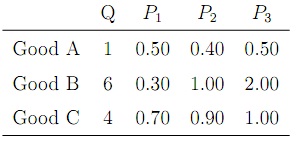Question 1: Explain whether the following transactions are counted in the GDP. If so, denote whether the expenditure approach would categorize the spending as C (household consumption), G (government spending), I (gross private investment), EX (exports) or I (imports).
A) A housing developer sells 25 homes in a new subdivision in Central California to 25 different households.
B) A comic book store sells a vintage 1998 Amazing Spiderman comic to an avid collector.
C) General Motors sells a fleet of trucks to the US Postal Service.
D) Subway buys 2 tons of avocados from California.
E) Subway buys 2 tons of avocados from Mexico.
Question 2: The market basket for an imaginary consumer is given below, as are the prices over the course of three years.

A) Create a Consumer Price Index with Year 2 as the base year.
B) What is the level of inflation from Year 1 to Year 2? How about from Year 2 to Year 3?
C. Why might the inflation rate be overstated by the CPI?
Question 3: Suppose Small Country has 15 residents aged at least 16. 3 are retired, 3 are students, 2 work as clerks the two country stores, 2 work at the country bank, 3 are currently looking for work but have not worked in the last month, 1 owns and operates all of the country's businesses, and 1 is in jail.
A) What is the unemployment rate?
B) What is the labor force participation rate?
C) Suppose 2 of the currently unemployed workers become discouraged and stop looking for work. What would be the new unemployment and labor force participation rates?
Question 4: Suppose Small Country has 4 households and 3 businesses. Each of the 4 households purchased $20,000 in food and gasoline consumption and $3,000 in movie tickets this year. Two households purchased a new $10,000 car produced in Small Country and one household purchased the used 2-year old car being replaced by one of those households for $4,000. One household purchased a newly constructed house for $100,000.
Each of the 3 businesses spent $15,000 in new computers, while their existing computers depreciated by $3,000. They each spent $5,000 on intermediate inputs used to produce their final product from other businesses in Small Country. Each business added $1,000 of inventory to their current stock at the end of the year.
The government of small country spent $10,000 on paper and $12,000 on new computers. Existing computers depreciated by $4,000. Small Country exported $12,000 worth of socks and imported all of its gasoline ($15,000 worth).
A) Use the expenditure method to compute Small Country's gross domestic product (GDP = C + I + G + NX).
B) Suppose we used the income method to compute Small Country's GDP. Why do we have to add depreciation to the national income in order to arrive at the GDP?
Question 5: The Washington Post recently ran an article discussing the current status of labor force participation and unemployment in the United States, positing many theories about why labor force participation has fallen o�. Read the article, found at https://www.washingtonpost.com/blogs/wonkblog/wp/2013/09/06/the-incredible-shrinking-labor-force-again/
A) What indicates that, even though the unemployment rate is falling, the labor market still not be very strong? Explain how a falling labor force participation rate may lead to lower unemployment.
B) Why does the author suggest that a labor force shrinking due to discouraged workers is worse for the country than a labor force shrinking due to students staying in school longer?